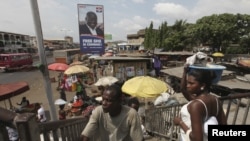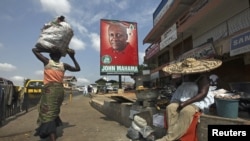A group of poll observers from the Economic Community of West African States (ECOWAS) is scheduled to arrive in Ghana’s capital, Accra Monday to monitor the December 7 general election.
“ECOWAS is very much involved in trying to consolidate the democratic gains that we have made over the years in order to create the conducive environment for inward investment and for development, which is the core objective for ECOWAS,” said ECOWAS political director Abdel-Fatau Musah.
“We are going into Ghana with a 250 strong observer mission to monitor the conduct of the election,” continued Musah. He added they will try to help resolve any challenges that might arise after the election.
The ECOWAS poll observers are scheduled to monitor the vote in all of Ghana’s 10 regions.
For the past few years, Musah says, Ghana has demonstrated a shining example of democracy in Africa.
“We need to build on that,” continued Musah, “and then to let Ghana and a few other countries like Sierra Leone, Cape Verde and even Nigeria to try to build a critical mass of best practices as far as electoral and democratic processes are concerned.”
Musah says the observer group, led by former Nigerian president Olusegun Obasanjo, will monitor the activities of all political parties.
“At the beginning of October, ECOWAS has already dispatched a fact finding mission to Ghana, during which time the mission met with all the principal stakeholders in the electoral process including government officials, the main political parties and their leaders, and the electoral commission,” said Musah.
Incumbent President John Dramani Mahama of the ruling National Democratic Congress (NDC) faces a stiff challenge from main opposition leader Nana Addo Dankwa Akufo-Addo of the New Patriotic Party, Abu Sakara Foster of the Convention People’s Party (CPP), Papa Kwesi Nduom of the Progressive People’s Party (PPP) and Hassan Ayariga of the People's National Convention (PNC) among others.
Musah says monitoring the election forms part of the regional bloc’s effort to strengthen the culture of democracy in West Africa.
“It is within the framework of the supplementary protocol on democracy and good governance, which lists out the conditions under which ECOWAS must assist member states in the conduct of credible, transparent and free and fair elections in their countries,” said Musah.
“ECOWAS is very much involved in trying to consolidate the democratic gains that we have made over the years in order to create the conducive environment for inward investment and for development, which is the core objective for ECOWAS,” said ECOWAS political director Abdel-Fatau Musah.
“We are going into Ghana with a 250 strong observer mission to monitor the conduct of the election,” continued Musah. He added they will try to help resolve any challenges that might arise after the election.
The ECOWAS poll observers are scheduled to monitor the vote in all of Ghana’s 10 regions.
For the past few years, Musah says, Ghana has demonstrated a shining example of democracy in Africa.
“We need to build on that,” continued Musah, “and then to let Ghana and a few other countries like Sierra Leone, Cape Verde and even Nigeria to try to build a critical mass of best practices as far as electoral and democratic processes are concerned.”
Musah says the observer group, led by former Nigerian president Olusegun Obasanjo, will monitor the activities of all political parties.
“At the beginning of October, ECOWAS has already dispatched a fact finding mission to Ghana, during which time the mission met with all the principal stakeholders in the electoral process including government officials, the main political parties and their leaders, and the electoral commission,” said Musah.
Incumbent President John Dramani Mahama of the ruling National Democratic Congress (NDC) faces a stiff challenge from main opposition leader Nana Addo Dankwa Akufo-Addo of the New Patriotic Party, Abu Sakara Foster of the Convention People’s Party (CPP), Papa Kwesi Nduom of the Progressive People’s Party (PPP) and Hassan Ayariga of the People's National Convention (PNC) among others.
Musah says monitoring the election forms part of the regional bloc’s effort to strengthen the culture of democracy in West Africa.
“It is within the framework of the supplementary protocol on democracy and good governance, which lists out the conditions under which ECOWAS must assist member states in the conduct of credible, transparent and free and fair elections in their countries,” said Musah.






